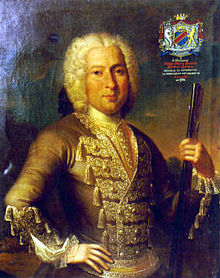
Biagio Bernardo Caboga ( German: Blasius Bernhard von Caboga, [1] French: Blaise Caboga) (1779-1854 [2]) was a Ragusan count (conte) and commander. He participated in the Ragusan uprising against the French, who had occupied since 1806 (abolished in 1808), in 1813–14. [3] With British support, he led the uprising after October 1813. [4] Together with Austrian general Milutinović and British cannons, the Ragusan rebel leaders led the siege of the city in January 1814. [5] The French surrendered on the 27th, marching out of the city on 28 January. [6] Ragusa and its territories were handed over to the Habsburg monarchy in 1815. [7] Despite his intelligence and ability, being described as having Alcibiades' qualities, his ambition seemed to have been the main cause to the failure of the aims of the rebellion. [3]
References
- ^ Österreichisch-ungarische Revue. C. Gerold's Sohn. 1888.
- ^ "Hrvatski biografski leksikon".
- ^ a b Ćosić 2000, p. 132.
- ^ Ćosić 2000, pp. 132–133.
- ^ Ćosić 2000, pp. 139–140.
- ^ Ćosić 2000, p. 141.
- ^ Ćosić 2000, p. 142.
Sources
- Ćosić, Stjepan (2000). "Dubrovnik Under French Rule (1810–1814)" (PDF). Dubrovnik Annals (4): 103–142. Retrieved 11 September 2009.
- Francis W. Carter (1972). Dubrovnik (Ragusa): A Classic City-state. Seminar Press. ISBN 978-0-12-812950-0.
- Harriet Bjelovučić (1970). The Ragusan Republic: Victim of Napoleon and Its Own Conservatism. Brill Archive. pp. 156–. GGKEY:1ERFSC27Z6S.

Biagio Bernardo Caboga ( German: Blasius Bernhard von Caboga, [1] French: Blaise Caboga) (1779-1854 [2]) was a Ragusan count (conte) and commander. He participated in the Ragusan uprising against the French, who had occupied since 1806 (abolished in 1808), in 1813–14. [3] With British support, he led the uprising after October 1813. [4] Together with Austrian general Milutinović and British cannons, the Ragusan rebel leaders led the siege of the city in January 1814. [5] The French surrendered on the 27th, marching out of the city on 28 January. [6] Ragusa and its territories were handed over to the Habsburg monarchy in 1815. [7] Despite his intelligence and ability, being described as having Alcibiades' qualities, his ambition seemed to have been the main cause to the failure of the aims of the rebellion. [3]
References
- ^ Österreichisch-ungarische Revue. C. Gerold's Sohn. 1888.
- ^ "Hrvatski biografski leksikon".
- ^ a b Ćosić 2000, p. 132.
- ^ Ćosić 2000, pp. 132–133.
- ^ Ćosić 2000, pp. 139–140.
- ^ Ćosić 2000, p. 141.
- ^ Ćosić 2000, p. 142.
Sources
- Ćosić, Stjepan (2000). "Dubrovnik Under French Rule (1810–1814)" (PDF). Dubrovnik Annals (4): 103–142. Retrieved 11 September 2009.
- Francis W. Carter (1972). Dubrovnik (Ragusa): A Classic City-state. Seminar Press. ISBN 978-0-12-812950-0.
- Harriet Bjelovučić (1970). The Ragusan Republic: Victim of Napoleon and Its Own Conservatism. Brill Archive. pp. 156–. GGKEY:1ERFSC27Z6S.